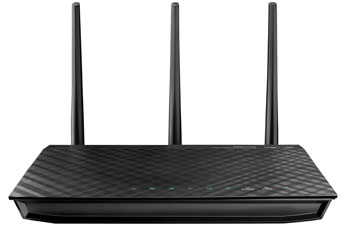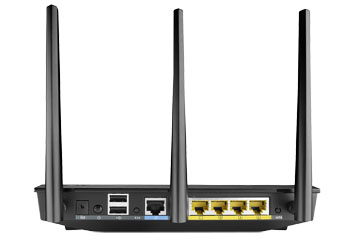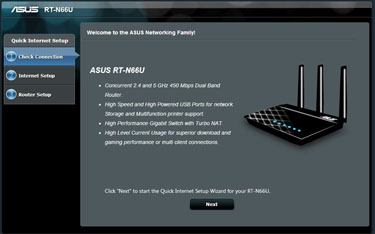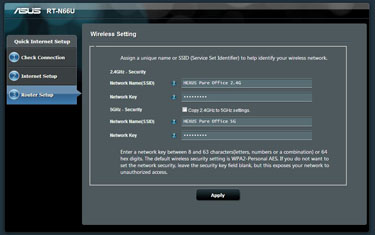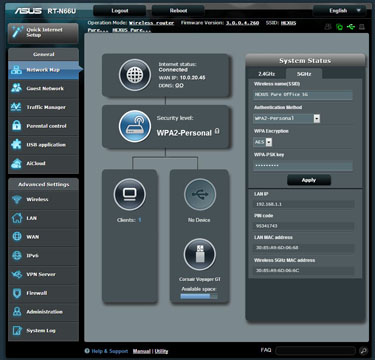The Bruce Wayne of routers
The proliferation of high-definition data being stored on local hard drives and home network-attached storage (NAS) boxes shows no signs of abating. Couple this with ever-increasing broadband speeds and the ability to mete out data to a bunch of wirelessly connected devices - laptops, tablets, et al - is putting the onus on home networks and routers to provide heaps of bandwidth.
Meet the ASUS RT-N66U, a £100 dual-band router that offers wireless data speeds of up to 900Mbps (N900) through the use of 2.4GHz and 5GHz bands operating at a full-speed 450Mbps. Sounds good, right? Do be aware that achieving such speeds on the device side requires compatible 450Mbps adapters, though, of course, the RT-N66U works with any Wi-Fi adapter, albeit at reduced throughput.
Look and feel
Dubbed the 'Dark Knight' router by dint of its Caped Crusader-like aesthetics, the N66U is a well-built piece of kit. A mock carbon-fibre weave is only punctured by a number of blue activity lights that aren't as piercing as some other routers', which is good to know if you happen to store it in a bedroom. Perhaps missing a trick, the lights cannot be turned off.
ASUS's minimalist front leads to the various ports all being grouped at the back alongside a trio of necessary antennas for wide-area coverage and fast speeds. Four yellow-coloured Gigabit ports provide speedy connectivity to wired computers, and to the right is a button for activating a Wireless-Protected Setup (WPS). Cramming the left-hand side is the power-inlet; power button; two USB 2.0 ports for printers and external hard drives; a tiny reset button, and, finally, the expected WAN port. We'd encourage ASUS to spread the port love by moving a few to either side.
The Dark Knight router sits nicely on a desk, with four thick rubber feet raising it enough such that a little air can reach the ventilation grilles at the bottom. There's also a bundled clip-in stand which raises the router to an almost-vertical orientation, though this causes the antennas and ports to point up in the air, giving the router a somewhat menacing look.
Inside, if you care, ASUS uses a Broadcom BCM4706 CPU and BCM53115 switch for the Gigabit ports, while a BCM4331 chip is used for the radio. The components are kept cool via a fanless heatsink.
Setup and usage
In common with other premium routers, ASUS offers easy setup and a step-by-step CD installation is provided for novice users. Experienced users can simply power up, connect the router to a network, send the browser to 192.168.1.1 - the default configuration page - and get going.
A straightforward graphical user interface makes it easy to configure the N66U's many options. Six accounts can be setup on the guest WiFi network - three on each band - where access to your LAN is prohibited, while the traffic manager offers priority for chosen protocols such as general surfing or FTP usage.
The two USB 2.0 ports can act as a basic network-storage device (NAS), where content is shared between router-connected clients, so it's a shame they're not of the faster USB 3.0 variety. Extending the reach further, the N66U has baked-in tools that mimic a download manager on a regular PC, too.
What's more, the Dark Knight's USB ports readily accept mobile-broadband dongles that effectively turn the N66U into a 'wire-free' router. Advanced settings enable users to delve deeper into a myriad of settings, but we'd advise novice users to steer clear. Most options are configurable without requiring a router reboot.
We found no major omissions in the feature-set when evaluating it as a premium home router, and ASUS has done a good job in creating an easy-to-use GUI for what can be an intimidating number of options for a first-time user.






